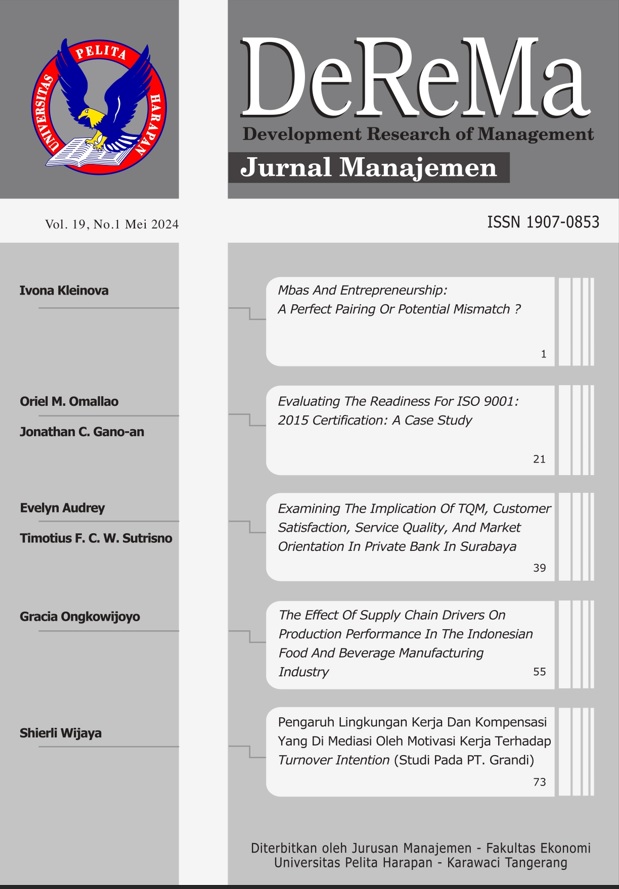MBAS AND ENTREPRENEURSHIP: A PERFECT PAIRING OR POTENTIAL MISMATCH?
DOI:
https://doi.org/10.19166/derema.v19i1.7473Keywords:
entrepreneurship, start-up, MBA graduate entrepreneur, MBA program, MBA management tools and strategiesAbstract
The world economy has been experiencing and indeed appreciating the golden era of entrepreneurialism for quite some time now. The crucial element in this movement is entrepreneurs plentifully consuming accessible know-how and contemplating various funding options while benefiting from the digitised and globalised world. However, they often fail to succeed. In this paper, I assess the experience and knowledge of MBA graduate entrepreneurs on starting and running real businesses. I aim to explore what areas of new business development an MBA assists a nascent entrepreneur in launching a business. The research also intends to explore crucial MBA management tools and strategies vital in the start-up phase of a new business. To establish valid and robust empirical findings, I in-depth interviewed 10 MBA graduate entrepreneurs best acquainted with the research area. The study highlighted several areas within a new business formation where an MBA could assist a new entrepreneur and indicates as many as 26 MBA management tools and strategies that can be employed.
Abstrak dalam Bahasa Indonesia. Ekonomi dunia telah mengalami dan benar-benar menghargai era keemasan kewirausahaan untuk waktu yang cukup lama. Elemen krusial dalam gerakan ini adalah para pengusaha yang melimpah mengonsumsi pengetahuan yang mudah diakses dan mempertimbangkan berbagai pilihan pendanaan sambil memanfaatkan dunia yang terdigitalisasi dan terglobalisasi. Namun, mereka seringkali gagal untuk berhasil. Dalam makalah ini, saya menilai pengalaman dan pengetahuan para pengusaha lulusan MBA dalam memulai dan menjalankan bisnis nyata. Saya bertujuan untuk menjelajahi bidang-bidang pengembangan bisnis baru di mana seorang MBA membantu seorang pengusaha pemula dalam meluncurkan bisnis. Penelitian ini juga bermaksud untuk menjelajahi alat-alat manajemen dan strategi MBA yang penting dalam fase awal sebuah bisnis baru. Untuk mendapatkan temuan empiris yang valid dan kuat, saya melakukan wawancara mendalam dengan 10 pengusaha lulusan MBA yang paling akrab dengan area penelitian. Studi ini menyoroti beberapa area dalam pembentukan bisnis baru di mana seorang MBA dapat membantu seorang pengusaha baru dan menunjukkan sebanyak 26 alat manajemen dan strategi MBA yang dapat digunakan.
References
Abd Rahim, N., Mohamed, Z., Tasir, Z., & Shariff, S. A. (2022). Impact of experiential learning and case study immersion on the development of entrepreneurial self-efficacy and opportunity recognition among engineering students. Higher Education Pedagogies, 7(1), https://doi.org/10.1080/23752696.2022.2109500
Ahmed, T., Chandran, V. G. R., & Klobas, J. (2017). Specialized entrepreneurship education: Does it really matter? Fresh evidence from Pakistan. International Journal of Entrepreneurial Behaviour & Research, 23(1), 4-19. https://doi.org/10.1108/IJEBR-01-2016-0005
Allahar, H., & Brathwaite, C. (2017). Entrepreneurship education for executive MBAs: The case of a Caribbean business school. Industry & Higher Education, 31(5), 305-317. https://doi.org/10.1177/0950422217718764
Amofah, K., Saladrigues, R., & Akwaa-Sekyi, E. K. (2020). Entrepreneurial intentions among MBA students. Cogent Business & Management, 7(1), 1-23. https://doi.org/10.1080/23311975.2020.1832401
Awaysheh, A., & Bonfiglio, D. (2017). Leveraging experiential learning to incorporate social entrepreneurship in MBA programs: A case study. The International Journal of Management Education, 15(2), 332-349. 332-349 https://doi.org/10.1016/j.ijme.2017.04.001
Babson College. (2023, August 18). Full time MBA. https://www.babson.edu/graduate/academics/mba-concentrations/
Bae, T. J., Qian, S., Miao, C., & Fiet, J. O. (2014). The relationship between entrepreneurship education and entrepreneurial intentions: A meta-analytic review. Entrepreneurship Theory and Practice, 38(2), 217-254. https://doi.org/10.1111/etap.12095
Baruch, Y. (2009). To MBA or not to MBA. Career Development International, 14(4), 388-406. https://doi.org/10.1108/13620430910979862
Bhatia, A. K. (2019). Fostering an entrepreneurial mindset in selective MBA programs. ProQuest Dissertations Publishing.
Bhatia, A. K., & Levina, N. (2020). Diverse Rationalities of entrepreneurship education: An epistemic stance perspective. Academy of Management Learning & Education, 19(3), 323-344. https://doi.org/10.5465/amle.2019.0201
Braun, V., & Clarke, V. (2022). Thematic analysis. Los Angeles, CA.: Sage.
Bruni-Bossio, V., & Delbaere, M. (2021). Not everything important is taught in the classroom: Using cocurricular professional development workshops to enhance student careers. Journal of Management Education, 45(2), 265-292. https://doi.org/10.1177/1052562920929060
Calvino, F., Criscuolo, C., & Menon, C. (2018). A cross-country analysis of start-up employment dynamics. Industrial and Corporate Change, 27(4), 1-698. https://doi.org/10.1093/icc/dty006
Clark, C. M., & Harrison, C. (2019). Entrepreneurship: An assimilated multi-perspective review. Journal of Small Business & Entrepreneurship, 31(1), 43-71. https://doi.org/10.1080/08276331.2018.1446665
Cornell University SC Johnson College of Business (2023, August 16). Johnson Cornell Tech MBA. https://www.johnson.cornell.edu/programs/full-time-mba/cornell-tech-mba/
Crouch, M., & McKenzie, H. (2006). The logic of small samples in interview-based qualitative research. Social Science Information, 45(4), 483-499. https://doi.org/10.1177/0539018406069584
Crysdian, C. (2022). The evaluation of higher education policy to drive university entrepreneurial activities in information technology learning. Cogent Education, 9(1). https://doi.org/10.1080/2331186X.2022.2104012
Cunningham, J. A., & O'Kane, C. (2017). Technology-based nascent entrepreneurship. New York: Palgrave Macmillan.
Daley, J. (2012). MBA smackdown. Entrepreneur, 40(10), 63-68.
DeMartino, R., & Barbato, R. (2003). Differences between women and men MBA entrepreneurs: Exploring family flexibility and wealth creation as career motivators. Journal of Business Venturing, 18(6), 815-832. https://doi.org/10.1016/S0883-9026(03)00003-X
Dennis, B. (2018). Validity as research praxis: A study of self-reflection and engagement in qualitative inquiry. Qualitative Inquiry, 24(2), 109-111. https://doi.org/10.1177/1077800416686371
Dilger, R. J. (2018). Small business size standards: A historical analysis of contemporary issues. Washington DC: Library of Congress. Congressional Research Service.
Easterby-Smith, M., Thorpe, R., & Jackson, P. (2012). Management research (4th ed.) London: Sage Publications.
Elliott, R. M. (2019). Social entrepreneurship as a catalyst to break the poverty trap: An analysis of the motivational factors in South Africa. Acta Commercii, 19(2), 1-13. https://doi.org/10.4102/ac.v19i2.652
Entrialgo, M., Iglesias, V., & Müller, F., (2019). Are European part-time MBA programs designed to foster entrepreneurial minds? An exploratory study. Administrative Sciences, 9(3), 48. https://doi.org/10.3390/admsci9030048
Henley, A. (2021). The rise of self-employment in the UK: Entrepreneurial transmission or declining job quality? Cambridge Journal of Economics, 45(3), 457-486. https://doi.org/10.1093/cje/beab007
Jobber, D., & Chadwick, F.-E. (2017). Principles and practice of marketing (7th ed.) Maidenhead, UK: McGraw-Hill Education.
Kerr, W., Nanda, R., & Rhodes-Kropf, M. (2014). Entrepreneurship as experimentation. Journal of Economic Perspectives, 28(3), 25-48. https://doi.org/10.1257/jep.28.3.25
Kim, M. G., Lee, J.-H., Roh, T., & Son, H. (2020). Social entrepreneurship education as an innovation hub for building an entrepreneurial ecosystem: The case of the KAIST social entrepreneurship MBA program. Sustainability (Basel, Switzerland), 12(22), 9736. https://doi.org/10.3390/su12229736
López-Núñez, M. I., Rubio-Valdehita, S., Aparicio-GarcÃa, M. E., & DÃaz-Ramiro, E. M. (2020). Are entrepreneurs born or made? The influence of personality. Personality and Individual Differences, 154 (2020), 109699. https://doi.org/10.1016/j.paid.2019.109699
Matsuda, N., & Matsuo, Y. (2017). Impact of MBA on entrepreneurial success: Do entrepreneurs acquire capacity through the program or does MBA only signal gifted talent and experience? Journal of Entrepreneurship & Organization Management, 6(1), 1-7. Retrieved from https://www.hilarispublisher.com/abstract/impact-of-mba-on-entrepreneurial-success-do-entrepreneurs-acquire-capacity-through-the-program-or-does-mba-only-signal-g-43604.html
Mele, G., Sansone, G., Secundo, G., & Paolucci, E. (2022). Speeding up student entrepreneurship: The role of university business idea incubators. IEEE Transactions on Engineering Management, 1-15. https://doi.org/10.1109/TEM.2022.3175655
Mintzberg, H. & (2005). Managers not MBAs: A hard look at the soft practice of managing and management development (6th ed.) Oakland, CA: Berrett-Koehler Publishers.
Mnykh, O. B., Dalyk, V. P., & Brytskyi, R. R. (2021). The transfer of innovative technologies in global and national markets and its impact on the economy. Bìznes Inform, 11(526), 35-41. https://doi.org/10.32983/2222-4459-2021-11-35-41
Mtapuri, O., & Lethoko, M. (2018). An MBA graduate as an" informed generalist": Is this good enough for employers? A case study of South African Business Schools. Global Media Journal: Turkish Edition, 9(17). https://globalmediajournaltr.yeditepe.edu.tr/sites/default/files/02_mtapuri_lethoko.pdf
Nagendra, A., Dobal, D., Ghildiyal, S., Gupta, E., & Gurung, A. (2014). Is an MBA degree essential for successful entrepreneurship? Procedia - Social and Behavioral Sciences, 133, 68-73. https://doi.org/10.1016/j.sbspro.2014.04.170
New York University Stern School of Business. (2023, August 17). Master of Business Administration (MBA) programs. https://www.stern.nyu.edu/programs-admissions/mba-programs
Nguyen, C. Q., Nguyen, A. M. T., & Ba Le, L. (2022). Using partial least squares structural equation modeling (PLS-SEM) to assess the effects of entrepreneurial education on engineering students's entrepreneurial intention. Cogent Education, 9(1). https://doi.org/10.1080/2331186X.2022.2122330
Nicolaou, N., Shane, S., Cherkas, L., Hunkin, J., & Spector, T.D. (2008). Is the tendency to engage in entrepreneurship genetic? Management Science, 54(1), 167-179. https://doi.org/10.1287/mnsc.1070.0761
Noble H., & Smith, J. (2015). Issues of validity and reliability in qualitative research. Evidence-Based Nursing, 18, 34-35. https://doi.org/10.1136/eb-2015-102054
Oliver, C., Pass, S., Taylor, J., & Taylor, P. (1991). Intrapreneurship and entrepreneurship amongst MBA graduates. Management Decision, 29(5), 8-11. https://doi.org/10.1108/00251749110023104
Parris, D. L., & McInnis-Bowers, C. (2017). Business not as usual: Developing socially conscious entrepreneurs and intrapreneurs. Journal of Management Education, 41(5), 687-726. https://doi.org/10.1177/1052562917720709
Piperopoulos, P., & Dimov, D. (2015). Burst bubbles or build steam? Entrepreneurship education, entrepreneurial self-efficacy, and entrepreneurial intentions. Journal of Small Business Management, 53(4), 970-985. https://doi.org/10.1111/jsbm.12116
Radianto, W., & Santoso, E. (2017). Start-up business: Process and challenges in entrepreneurship education. Mediterranean Journal of Social Sciences, 8(4), 97-110. https://www.richtmann.org/journal/index.php/mjss/article/view/9997/9630
Rauch, A., & Hulsink, W. (2015). Putting entrepreneurship education where the intention to act lies: An investigation into the impact of entrepreneurship education on entrepreneurial behavior. Academy of Management Learning & Education, 14(2), 187-204. https://doi.org/10.5465/amle.2012.0293
Rideout, E. C., & Gray, D. O. (2013). Does entrepreneurship education really work? A review and methodological critique of the empirical literature on the effects of university-based entrepreneurship education. Journal of Small Business Management, 51(3), 329-351. https://doi.org/10.1111/jsbm.12021
Robson, C. (2002). Real world research (2nd ed.) Oxford: Blackwell.
Sar, A. K. (2017). The influence of management education on entrepreneurship success. Journal of Entrepreneurship Education, 20(2), 1-17. https://www.abacademies.org/articles/The-influence-of-management-education-on-entrepreneurship-success-1528-2651-20-2-116.pdf
Saunders, M., Lewis, P., & Thornhill, A. (2007). Research methods for business students (4th ed.) London: Pearson Education Limited.
Schneck, S. (2014). Why the self-employed are happier: Evidence from 25 European countries. Journal of Business Research, 67(6), 1043-1048. https://doi.org/10.1016/j.jbusres.2013.06.008
Schultz, C. (2022). A balanced strategy for entrepreneurship education: Engaging students by using multiple course modes in a business curriculum. Journal of Management Education, 46(2), 313-344. https://doi.org/10.1177/10525629211017958
Shane, S., Nicolaou, N., Cherkas, L., & Spector, T.D. (2010). Genetics, the Big Five, and the tendency to be self-employed. Journal of Applied Psychology, 95(6), 1154-1162. https://doi.org/10.1037/a0020294
Shen, H.-Z., & Yang, H. (2022). Educational entrepreneurship in Australian community languages schools: An analysis of ethnic principals' experience and practice. Cogent Education, 9(1). https://doi.org/10.1080/2331186X.2022.2090187
Svaleryd, H. (2015). Self-employment and the local business cycle. Small Business Economics, 44(1), 55-70. https://doi.org/10.1007/s11187-014-9592-2
Thrane, C., Blenker, P., Korsgaard, S., & Neergaard, H. (2016). The promise of entrepreneurship education: Reconceptualizing the individual-opportunity nexus as a conceptual framework for entrepreneurship education. International Small Business Journal, 34(7), 905-924. https://doi.org/10.1177/0266242616638422
Turner, A. D., Stawicki, S. P., & Guo, W. A. (2017). Competitive advantage of MBA for physician executives: A systematic literature review. World Journal of Surgery, 42(6), 1655-1665. https://doi.org/10.1007/s00268-017-4370-3
Ver Steeg, J. (2022). Anatomy of entrepreneurship: Using key competencies to drive social capital acquisition and develop social entrepreneurship practices in MBA education. The International Journal of Management Education, 100661. https://doi.org/10.1016/j.ijme.2022.100661
World Bank (2022, September). Improving SMEs’ access to finance and finding innovative solutions to unlock sources of capital. https://www.worldbank.org/en/topic/smefinance
Downloads
Published
Issue
Section
License
Authors who publish with this journal agree to the following terms:
1) Authors retain copyright and grant the journal right of first publication with the work simultaneously licensed under a Creative Commons Attribution License (CC-BY-SA 4.0) that allows others to share the work with an acknowledgement of the work's authorship and initial publication in this journal.
2) Authors are able to enter into separate, additional contractual arrangements for the non-exclusive distribution of the journal's published version of the work (e.g., post it to an institutional repository or publish it in a book), with an acknowledgement of its initial publication in this journal.
3) Authors are permitted and encouraged to post their work online (e.g., in institutional repositories or on their website). The final published PDF should be used and bibliographic details that credit the publication in this journal should be included.





